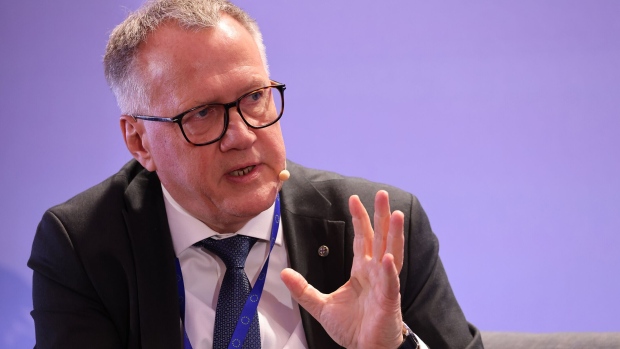Mar 11, 2024
Latvia to Ease Some Finance Restrictions After Banking Crackdown
, Bloomberg News

(Bloomberg) -- Latvia’s finance chief said the Baltic nation will begin easing some of its financial regulations after the collapse of a major bank six years ago triggered a wave of restrictions that foreign investors have called onerous.
The crackdown instituted after the 2018 fallout was sparked by US accusations of money laundering against the country’s second-biggest bank and culminated in the arrest of Latvia’s central bank governor. A move to tighten access to financial services in the nation of 2 million has given way to complaints the restrictions are curbing investment, including comments from the US ambassador.
“The anti-money laundering situation in Latvia has stabilized and therefore we can reduce some of the de-risking,” Finance Minister Arvils Aseradens said in an interview in Riga.
Latvia’s government and regulator are in talks to ease rules after a raft of restrictions sought to expel illicit finance, shut out shell companies and reduce a foreign client base. The central bank in Riga says improving access to financial services is one of its top priorities for this year.
The barriers to access to Latvian banking were highlighted by US Ambassador Christopher Robinson, who recently said the country had lost tens of millions of dollars in US investment because of the stringent rules. It marked a contrast with 2018, when the US Treasury Department helped trigger the fallout with the money-laundering accusations.
“Shortly after arriving, I had looked into trying to open an account, and after looking at the very significant hurdles that an American faces here in trying to open an account, I did not pursue that process,” Robinson said in an interview with Latvian TV.
Latvia’s banking sector, dominated by Swedish and US private equity investment, has grappled with a dearth of lending and a cautious approach to securing clients and deals, even as they booked surging profits on higher interest rates.
“The financial sector in Latvia is actively cooperating with the Bank of Latvia on de-risking issues in order to reduce obstacles for clients with manageable risk,” said Edgars Pastars, chief legal officer for the Finance Latvia Association. New rules will be aimed at improving communication with clients, he said.
Latvia is also courting global lenders. Prime Minister Evika Silina recently met with Commerzbank AG Chief Executive Officer Manfred Knof as well as representatives of Bank Pekao SA and PKO Bank Polski in Poland. President Gitanas Nauseda of neighboring Lithuania met with Deutsche Bank CEO Christian Sewing at the World Economic Forum, another potential boon for the region.
Aseradens particularly welcomed the Bundesbank’s decision to open its outpost in Riga, alongside places such as London, New York, Singapore and Tokyo. The move “absolutely” helps attract foreign banks, he said.
It’s “a very important step in this direction, when banks would be interested in the Latvian market,” Aseradens said.
©2024 Bloomberg L.P.








